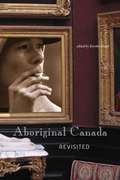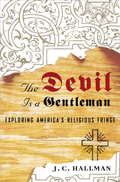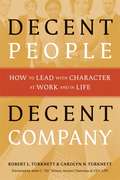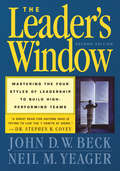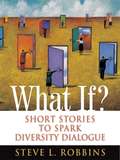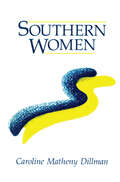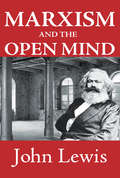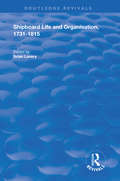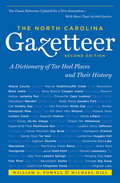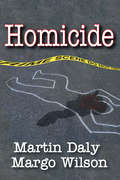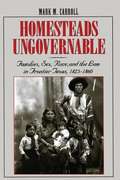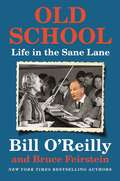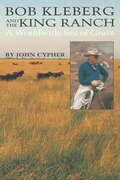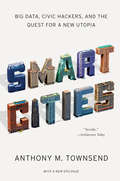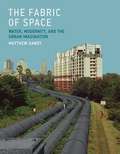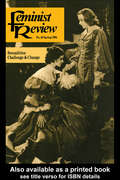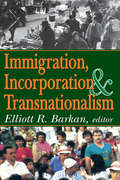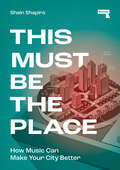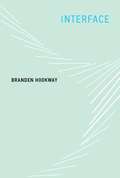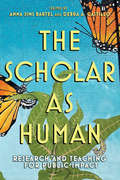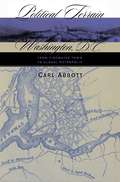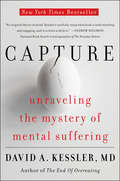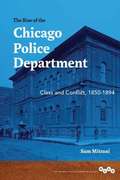- Table View
- List View
Consumer price index manual: Theory and practice
by International Monetary FundA report from the International Monetary Fund.
Aboriginal Canada Revisited: Politics And Cultural Expression In The 21st Century (International Canadian Studies Series)
by Kerstin KnopfExploring a variety of topics—including health, politics, education, art, literature, media, and film—Aboriginal Canada Revisited draws a portrait of the current political and cultural position of Canada’s Aboriginal peoples. While lauding improvements made in the past decades, the contributors draw attention to the systemic problems that continue to marginalize Aboriginal people within Canadian society.From the Introduction: “[This collection helps] to highlight areas where the colonial legacy still takes its toll, to acknowledge the manifold ways of Aboriginal cultural expression, and to demonstrate where Aboriginal and non-Aboriginal people are starting to find common ground.”Contributors include Aboriginal and non-Aboriginal scholars from Europe and Canada, including Marlene Atleo, University of Manitoba; Mansell Griffin, Nisga’a Village of Gitwinksihlkw, British Columbia; Robert Harding, University College of the Fraser Valley; Tricia Logan, University of Manitoba; Steffi Retzlaff, McMaster University; Siobhán Smith, University of British Columbia; Barbara Walberg, Confederation College.
The Devil Is a Gentleman
by J. C. HallmanA hundred years ago, the writer and philosopher William James wrote The Varieties of Religious Experience, a seminal work that has inspired generations of scholars and eccentrics alike. James’s book argues that the religious spirit in man is best understood through the study of its most extreme forms. Varieties was a watershed effort: a bestselling portrait of history’s pluralism and a defense of the spiritual quest, in all its guises, against the era’s increasingly secular sentiments. Today, with all the old tensions between skeptics and believers still in place, J. C. Hallman pays homage to James’s exploration of offbeat religious movements. But where James relied on the testimony and biographies of prophets and mystics, Hallman travels directly to some of America’s newest and most unusual religions, trekking from Druid circles in the mossy hills of northern California to the gleaming mother church of Scientology, from lurid satanic cellars in undisclosed locations to a professional-wrestling ministry in the fundamentalist heart of Texas. Along the way, he participates in a variety of rites and reports on a broad spectrum of beliefs. Eventually Hallman adopts James as his patron saint, spiritual adviser, and intellectual companion on the journey that will culminate in the creation of this book, a compelling combination of adventure and biography, spotted with hair-raising predicaments and rife with poignant portraits of unforgettable characters, including William James himself. The Devil Is a Gentlemanmaps the spiritual contours of modern American pluralism and examines the life and legacy of one of its most profound architects. From the Hardcover edition.
Decent People, Decent Company: How to Lead with Character at Work and in Life
by Robert L. Turknett Carolyn N. Turknett Kent C. NelsonThe inspiring people who lead with integrity, move things forward, garner commitment from others and are willing to ask the tough questions when necessary are the real leaders who generate and sustain cultures of character in organizations. Decent People, Decent Company puts the power to develop the core qualities of leadership character into the hands of anyone dedicated to bringing integrity, respect and personal responsibility back to the workplace. Drawing on more than 25 years of experience working with hundreds of CEOs, managers and teams, this innovative husband-and-wife team provides both the inspiration and the tools to help people move from asking "Why don't they?" to asking "What can I?" With their original and dynamic Leadership Character Model, the Turknetts have captured the essence of what it takes to revitalize attitudes and behavior, unleash leadership integrity and reinvigorate organizations. Decent People, Decent Company identifies the eight essential traits of leadership character: empathy, emotional mastery, lack of blame, humility, accountability, courage, self-confidence and focus on the whole. In chapters that focus on each quality, dozens of leaders bring to life the struggles and triumphs of developing the behaviors of character and ethical leadership required to bring out the best in everyone.
The Leader's Window: Mastering the Four Styles of Leadership to Build High-Performing Teams
by John D.W. Beck Neil YeagerThe Leader's Window presents an authoritative leadership system to help you give your employees what they need, when they need it, in a form in which they can use it. New and updated leader profiles and case examples illustrate the variety of successful strategies high-profile leaders use, while stories of misguided leadership show pitfalls to avoid. With new information on managing Generation X and adapting to diverse personality types, this classic resource presents the strategies you need to make the most of individual capabilities and simultaneously achieve goals. Charts, action lists, cases for reflection, process plans, performance contracts, self-assessments and tools to crease baseline leadership measures provide the help you need to harness the potential of each worker and transform that potential into results-driven teams.
What If?
by Steve Long-Nguyen RobbinsWhat If? delivers a highly creative and innovative new way to explore the issues that dominate today's multicultural, multiethnic workplace. To the twenty-five witty yet inspiring stories in this collection, Steve Long-Nguyen Robbins has added tips and suggestions for putting these key learnings into action. Combined, What If? offers a powerful lens into the human experience.
Southern Women
by Caroline M. DillmanFirst published in 1988. Routledge is an imprint of Taylor & Francis, an informa company.
Marxism and the Open Mind (Routledge Library Editions: Marxism Ser.)
by John LewisIn Marxism and the Open Mind, John Lewis seeks to explain Marxism as a system of thought. In doing so, he addresses the studied neglect or grotesque misrepresentation that he feels characterizes Western attitudes toward Marxism. Lewis also aims to stimulate what he believes to be a long overdue re-evaluation of Marxism in the light of what was contemporary thought in 1957, the year of the book's original publication and the height of the Cold War era.The essays include chapters on human rights and a discussion on Marxism and liberty. Marxist ethics, a much-neglected theme, is the subject of an essay that deals with some of the most deeply felt criticisms of Marxism in the 1950s. The ethical aspects of Marxism are examined once again in a contribution to the debate on Marxism and religion. The volume concludes with essays on Berdyaev and Sartre, which strike a note on the Marxist estimation of these thinkers, and with an essay on Marxist humanism.The essays cover a wide field of thought, uniting a close and sympathetic study of Marxism with a critical judgment rooted in academic training at three universities and experience in the Christian ministry.
Shipboard Life and Organisation, 1731-1815 (Routledge Revivals)
by Brian LaveryFirst published in 1998, this volume explores the Royal Navy which had most of its greatest triumphs in the decades up to 1815, but has received relatively little study of its social life and shipboard administration, beyond popular myth and sensational accounts. This volume starts with the formal structure of naval discipline, with Admiralty instructions and captains' orderbooks. It then looks at how things really happened, using diaries, medical journals, petitions, court martial reports and even the menu book of a semi-literate steward. It reveals many strong characters and colourful incidents of shipboard life, while providing material for study.
The North Carolina Gazetteer: A Dictionary of Tar Heel Places and Their History
by William S. Powell Michael HillThe North Carolina Gazetteerfirst appeared to wide acclaim in 1968 and has remained an essential reference for anyone with a serious interest in the Tar Heel State, from historians to journalists, from creative writers to urban planners, from backpackers to armchair travelers. This revised and expanded edition adds approximately 1,200 new entries, bringing to nearly 21,000 the number of North Carolina cities, towns, crossroads, waterways, mountains, and other places identified here. The stories attached to place names are at the core of the book and the reason why it has stood the test of time. Some recall faraway places: Bombay, Shanghai, Moscow, Berlin. Others paint the locality as a little piece of heaven on earth: Bliss, Splendor, Sweet Home. In many cases the name derivations are unusual, sometimes wildly so: Cat Square, Huggins Hell, Tater Hill, Whynot. Telling us much about our own history in these snapshot histories of particular locales,The North Carolina Gazetteerprovides an engaging, authoritative, and fully updated reference to place names from all corners of the Tar Heel State.
Homicide: Foundations of Human Behavior (Foundations of Human Behavior)
by Martin Daly Margo WilsonThe human race spends a disproportionate amount of attention, money, and expertise in solving, trying, and reporting homicides, as compared to other social problems. The public avidly consumes accounts of real-life homicide cases, and murder fiction is more popular still. Nevertheless, we have only the most rudimentary scientific understanding of who is likely to kill whom and why. Martin Daly and Margo Wilson apply contemporary evolutionary theory to analysis of human motives and perceptions of self-interest, considering where and why individual interests conflict, using well-documented murder cases. This book attempts to understand normal social motives in murder as products of the process of evolution by natural selection. They note that the implications for psychology are many and profound, touching on such matters as parental affection and rejection, sibling rivalry, sex differences in interests and inclinations, social comparison and achievement motives, our sense of justice, lifespan developmental changes in attitudes, and the phenomenology of the self. This is the first volume of its kind to analyze homicides in the light of a theory of interpersonal conflict. Before this study, no one had compared an observed distribution of victim-killer relationships to "expected" distribution, nor asked about the patterns of killer-victim age disparities in familial killings. This evolutionary psychological approach affords a deeper view and understanding of homicidal violence.
Homesteads Ungovernable: Families, Sex, Race, and the Law in Frontier Texas, 1823-1860
by Mark M. CarrollWhen he settled in Mexican Texas in 1832 and began courting Anna Raguet, Sam Houston had been separated from his Tennessee wife Eliza Allen for three years, while having already married and divorced his Cherokee wife Tiana and at least two other Indian "wives" during the interval. Houston's political enemies derided these marital irregularities, but in fact Houston's legal and extralegal marriages hardly set him apart from many other Texas men at a time when illicit and unstable unions were common in the yet-to-be-formed Lone Star State.<P>In this book, Mark Carroll draws on legal and social history to trace the evolution of sexual, family, and racial-caste relations in the most turbulent polity on the southern frontier during the antebellum period (1823-1860). He finds that the marriages of settlers in Texas were typically born of economic necessity and that, with few white women available, Anglo men frequently partnered with Native American, Tejano, and black women. While identifying a multicultural array of gender roles that combined with law and frontier disorder to destabilize the marriages of homesteaders, he also reveals how harsh living conditions, land policies, and property rules prompted settling spouses to cooperate for survival and mutual economic gain. Of equal importance, he reveals how evolving Texas law reinforced the substantial autonomy of Anglo women and provided them material rewards, even as it ensured that cross-racial sexual relationships and their reproductive consequences comported with slavery and a regime that dispossessed and subordinated free blacks, Native Americans, and Tejanos.
Old School: Life in the Sane Lane
by Bruce Feirstein Bill O'Reilly<P>Old School is in session....You have probably heard the term Old School, but what you might not know is that there is a concentrated effort to tear that school down.It’s a values thing. The anti–Old School forces believe the traditional way of looking at life is oppressive. Not inclusive. The Old School way may harbor microaggressions. Therefore, Old School philosophy must be diminished. <P>Those crusading against Old School now have a name: Snowflakes. You may have seen them on cable TV whining about social injustice and income inequality. You may have heard them cheering Bernie Sanders as he suggested the government pay for almost everything. The Snowflake movement is proud and loud, and they don’t like Old School grads.So where are you in all this? <P>Did you get up this morning knowing there are mountains to climb—and deciding how you are going to climb them? Do you show up on time? Do you still bend over to pick up a penny? If so, you’re Old School. <P>Or did you wake up whining about safe spaces and trigger warnings? Do you feel marginalized by your college’s mascot? Do you look for something to get outraged about, every single day, so you can fire off a tweet defending your exquisitely precious sensibilities? Then you’re a Snowflake. <P>So again, are you drifting frozen precipitation? Or do you matriculate at the Old School fountain of wisdom?This book will explain the looming confrontation so even the ladies on The View can understand it. Time to take a stand. Old School or Snowflake. Which will it be? <P><b>A New York Times Bestseller</b>
Bob Kleberg and the King Ranch: A Worldwide Sea of Grass
by John CypherRanching on the vast scale that Texas is famous for actually happened at King Ranch, a sea of grass that ultimately spread its pastures to countries around the globe under the fifty-year leadership of Bob Kleberg. This absorbing biography, written by Kleberg's top assistant of many years, captures both the life of the man and the spirit of the kingdom he ruled, offering a rare, insider's view of life on a fabled Texas ranch. John Cypher spent forty years (1948-1988) on King Ranch. In these pages, he melds highlights of Kleberg's life with memories of his own experiences as the "right hand" who implemented many of Kleberg's grand designs. In a lively story laced with fascinating anecdotes he both recounts his worldwide travels with Kleberg as the ranch expanded its holdings to Latin America, Cuba, Australia, the Philippines, Europe, and Africa, and describes timeless, traditional tasks such as roundup at the home ranch in Kingsville. Kleberg's accomplishments as the founder of the Santa Gertrudis cattle breed and a breeder of Thoroughbred racing horses receive full attention, as does his fabled lifestyle, which included friendships not merely with the rich and famous but also with Queen Elizabeth the Queen Mother, who shared his love of horse racing. For everyone interested in ranching and one of its most famous practitioners, this book will be essential reading.
Smart Cities: Big Data, Civic Hackers, and the Quest for a New Utopia
by Anthony M. TownsendAn unflinching look at the aspiring city-builders of our smart, mobile, connected future. We live in a world defined by urbanization and digital ubiquity, where mobile broadband connections outnumber fixed ones, machines dominate a new "internet of things," and more people live in cities than in the countryside. In Smart Cities, urbanist and technology expert Anthony Townsend takes a broad historical look at the forces that have shaped the planning and design of cities and information technologies from the rise of the great industrial cities of the nineteenth century to the present. A century ago, the telegraph and the mechanical tabulator were used to tame cities of millions. Today, cellular networks and cloud computing tie together the complex choreography of mega-regions of tens of millions of people. In response, cities worldwide are deploying technology to address both the timeless challenges of government and the mounting problems posed by human settlements of previously unimaginable size and complexity. In Chicago, GPS sensors on snow plows feed a real-time "plow tracker" map that everyone can access. In Zaragoza, Spain, a "citizen card" can get you on the free city-wide Wi-Fi network, unlock a bike share, check a book out of the library, and pay for your bus ride home. In New York, a guerrilla group of citizen-scientists installed sensors in local sewers to alert you when stormwater runoff overwhelms the system, dumping waste into local waterways. As technology barons, entrepreneurs, mayors, and an emerging vanguard of civic hackers are trying to shape this new frontier, Smart Cities considers the motivations, aspirations, and shortcomings of them all while offering a new civics to guide our efforts as we build the future together, one click at a time.
The Fabric of Space
by Matthew GandyWater lies at the intersection of landscape and infrastructure, crossing between visible and invisible domains of urban space, in the tanks and buckets of the global South and the vast subterranean technological networks of the global North. In this book, Matthew Gandy considers the cultural and material significance of water through the experiences of six cities: Paris, Berlin, Lagos, Mumbai, Los Angeles, and London. Tracing the evolving relationships among modernity, nature, and the urban imagination, from different vantage points and through different periods, Gandy uses water as a lens through which to observe both the ambiguities and the limits of nature as conventionally understood. Gandy begins with the Parisian sewers of the nineteenth century, captured in the photographs of Nadar, and the reconstruction of subterranean Paris. He moves on to Weimar-era Berlin and its protection of public access to lakes for swimming, the culmination of efforts to reconnect the city with nature. He considers the threat of malaria in Lagos, where changing geopolitical circumstances led to large-scale swamp drainage in the 1940s. He shows how the dysfunctional water infrastructure of Mumbai offers a vivid expression of persistent social inequality in a postcolonial city. He explores the incongruous concrete landscapes of the Los Angeles River. Finally, Gandy uses the fictional scenario of a partially submerged London as the starting point for an investigation of the actual hydrological threats facing that city.
Feminist Review: Issue 46
by The Feminist The Feminist Review CollectiveA unique combination of the activist and the academic, Feminist Review has an acclaimed place within women's studies courses and the women's movement. Feminist Review is produced by a London-based editorial collective and publishes and reviews work by women; featuring articles on feminist theory, race, class and sexuality, women's history, cultural studies, Black and Third World feminism, poetry, photography, letters and much more. Feminist Review is available both on annual subscription and from bookstores. For a Free Sample Copy or for further subscription details please contact: Trevina Johnson, Routledge Subscriptions, ITPS Ltd, Cheriton House, North Way, Andover SP10 5BE. UK.
Immigration, Incorporation and Transnationalism
by Elliott R. BarkanImmigration, Incorporation and Transition is an intriguing collection of articles and essays. It was developed to commemorate the twenty-fi fth anniversary of The Journal of American Ethnic History. Its purpose, like that of the Immigration and Ethnic History Society, is to integrate interdisciplinary perspectives and exciting new scholarship on important themes and issues related to immigration and ethnic history.
This Must Be the Place: How Music Can Make Your City Better
by Shain ShapiroThis Must Be the Place explores how music can make cities better.This Must Be the Place introduces and examines music&’s relationship to cities. Not the influence cities have on music, but the powerful impact music can have on how cities are developed, built, managed and governed.Told in an accessible way through personal stories from cities around the world — including London, Melbourne, Nashville, Austin and Zurich — This Must Be the Place takes a truly global perspective on the ways music is integral to everyday life but neglected in public policy.Arguing for the transformative role of artists and musicians in a post-pandemic world, This Must Be The Place not only examines the powerful impact music can have on our cities, but also serves as a how-to guide and toolkit for music-lovers, artists and activists everywhere to begin the process of reinventing the communities they live in.
Interface
by Branden HookwayIn this book, Branden Hookway considers the interface not as technology but as a form of relationship with technology. The interface, Hookway proposes, is at once ubiquitous and hidden from view. It is both the bottleneck through which our relationship to technology must pass and a productive encounter embedded within the use of technology. It is a site of contestation -- between human and machine, between the material and the social, between the political and the technological -- that both defines and elides differences. A virtuoso in multiple disciplines, Hookway offers a theory of the interface that draws on cultural theory, political theory, philosophy, art, architecture, new media, and the history of science and technology. He argues that the theoretical mechanism of the interface offers a powerful approach to questions of the human relationship to technology. Hookway finds the origin of the term interface in nineteenth-century fluid dynamics and traces its migration to thermodynamics, information theory, and cybernetics. He discusses issues of subject formation, agency, power, and control, within contexts that include technology, politics, and the social role of games. He considers the technological augmentation of humans and the human-machine system, discussing notions of embodied intelligence. Hookway views the figure of the subject as both receiver and active producer in processes of subjectification. The interface, he argues, stands in a relation both alien and intimate, vertiginous and orienting to those who cross its threshold.
The Scholar as Human: Research and Teaching for Public Impact
The Scholar as Human brings together faculty from a wide range of disciplines—history; art; Africana, American, and Latinx studies; literature, law, performance and media arts, development sociology, anthropology, and Science and Technology Studies—to focus on how scholarship is informed, enlivened, deepened, and made more meaningful by each scholar's sense of identity, purpose, and place in the world. Designed to help model new paths for publicly-engaged humanities, the contributions to this groundbreaking volume are guided by one overarching question: How can scholars practice a more human scholarship?Recognizing that colleges and universities must be more responsive to the needs of both their students and surrounding communities, the essays in The Scholar as Human carve out new space for public scholars and practitioners whose rigor and passion are equally important forces in their work. Challenging the approach to research and teaching of earlier generations that valorized disinterestedness, each contributor here demonstrates how they have energized their own scholarship and its reception among their students and in the wider world through a deeper engagement with their own life stories and humanity.Contributors: Anna Sims Bartel, Debra A. Castillo, Ella Diaz, Carolina Osorio Gil, Christine Henseler, Caitlin Kane, Shawn McDaniel, A. T. Miller, Scott J. Peters, Bobby J. Smith II, José Ragas, Riché Richardson, Gerald Torres, Matthew Velasco, Sara WarnerThanks to generous funding from Cornell University, the ebook editions of this book are available as Open Access volumes from Cornell Open (cornellopen.org) and other repositories.
Political Terrain
by Carl AbbottWashington, D.C., President John F. Kennedy once remarked, is a city of "southern efficiency and northern charm." Kennedy's quip was close to the mark. Since its creation two centuries ago, Washington has been a community with multiple personalities. Located on the regional divide between North and South, it has been a tidewater town, a southern city, a coveted prize in fighting between the states, a symbol of a reunited nation, a hub for central government, an extension of the Boston-New York megalopolis, and an international metropolis.In an exploration of the many identities Washington has taken on over time, Carl Abbott examines the ways in which the city's regional orientation and national symbolism have been interpreted by novelists and business boosters, architects and blues artists, map makers and politicians. Each generation of residents and visitors has redefined Washington, he says, but in ways that have utilized or preserved its past. The nation's capital is a city whose history lives in its neighborhoods, people, and planning, as well as in its monuments and museums.
Capture: Unraveling the Mystery of Mental Suffering
by David A. KesslerWhy do we think, feel, and act in ways we wished we did not? For decades, New York Times bestselling author Dr. David A Kessler has studied this question with regard to tobacco, food, and drugs. Over the course of these investigations, he identified one underlying mechanism common to a broad range of human suffering. This phenomenon--capture--is the process by which our attention is hijacked and our brains commandeered by forces outside our control.In Capture, Dr. Kessler considers some of the most profound questions we face as human beings: What are the origins of mental afflictions, from everyday unhappiness to addiction and depression--and how are they connected? Where does healing and transcendence fit into this realm of emotional experience?Analyzing an array of insights from psychology, medicine, neuroscience, literature, philosophy, and theology, Dr. Kessler deconstructs centuries of thinking, examining the central role of capture in mental illness and questioning traditional labels that have obscured our understanding of it. With a new basis for understanding the phenomenon of capture, he explores the concept through the emotionally resonant stories of both well-known and un-known people caught in its throes.The closer we can come to fully comprehending the nature of capture, Dr. Kessler argues, the better the chance to alleviate its deleterious effects and successfully change our thoughts and behavior Ultimately, Capture offers insight into how we form thoughts and emotions, manage trauma, and heal. For the first time, we can begin to understand the underpinnings of not only mental illness, but also our everyday worries and anxieties. Capture is an intimate and critical exploration of the most enduring human mystery of all: the mind.
Envisioning Power: Ideologies of Dominance and Crisis
by Eric R. WolfWith the originality and energy that have marked his earlier works, Eric Wolf now explores the historical relationship of ideas, power, and culture. Responding to anthropology's long reliance on a concept of culture that takes little account of power, Wolf argues that power is crucial in shaping the circumstances of cultural production. Responding to social-science notions of ideology that incorporate power but disregard the ways ideas respond to cultural promptings, he demonstrates how power and ideas connect through the medium of culture. Wolf advances his argument by examining three very different societies, each remarkable for its flamboyant ideological expressions: the Kwakiutl Indians of the Northwest Pacific Coast, the Aztecs of pre-Hispanic Mexico, and National Socialist Germany. Tracing the history of each case, he shows how these societies faced tensions posed by ecological, social, political, or psychological crises, prompting ideological responses that drew on distinctive, historically rooted cultural understandings. In each case study, Wolf analyzes how the regnant ideology intertwines with power around the pivotal relationships that govern social labor. Anyone interested in the history of anthropology or in how the social sciences make comparisons will want to join Wolf in Envisioning Power.
The Rise of the Chicago Police Department: Class and Conflict, 1850-1894
by Sam MitraniIn this book, Sam Mitrani cogently examines the making of the police department in Chicago, which by the late 1800s had grown into the most violent, turbulent city in America. Chicago was roiling with political and economic conflict, much of it rooted in class tensions, and the city's lawmakers and business elite fostered the growth of a professional municipal police force to protect capitalism, its assets, and their own positions in society. Together with city policymakers, the business elite united behind an ideology of order that would simultaneously justify the police force's existence and dictate its functions. Tracing the Chicago police department's growth through events such as the 1855 Lager Beer riot, the Civil War, the May Day strikes, the 1877 railroad workers strike and riot, and the Haymarket violence in 1886, Mitrani demonstrates that this ideology of order both succeeded and failed in its aims. Recasting late nineteenth-century Chicago in terms of the struggle over order, this insightful history uncovers the modern police department's role in reconciling democracy with industrial capitalism.

